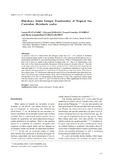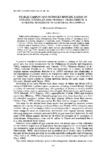Diet-tissue stable isotopic fractionation of tropical sea cucumber, Holothuria scabra
- Global styles
- MLA
- Vancouver
- Elsevier - Harvard
- APA
- Help

Download URL
www.jstage.jst.go.jpDate
2013Author
Page views
2,552ASFA keyword
AGROVOC keyword
Taxonomic term
Metadata
Show full item record
Share
Abstract
To provide a basis for a stable carbon and nitrogen isotope ratio \(\mathsf{(\delta^{13}C / \delta^{15}N)}\) analysis to determine the assimilated organic matter in sea cucumber, Holothuria scabra, diet-tissue fractionations were experimentally determined by mono-feeding rearing with diatom. While δ15N fractionation of the whole body wall (2.4‰) was similar to the commonly accepted value (2.6 - 4‰), δ13C fractionation of the body wall (4.2‰) showed considerable discrepancy with the commonly accepted value (0 - 1‰) due to the high content (35% dry wt/wt) of calcareous spicules (CaCO3) in the body wall, which had significantly higher δ13C (-8.6‰) than the organic fractions. Computational elimination of spicules based upon spicule content and spicule δ13C reduced the δ13C fractionation of the body wall to 1.5‰, close to the common value. δ13C fractionation after spicule removal by acid decarbonation and subsequent rinsing (3.2‰) did not agree with the common value, and δ15N fractionation was significantly elevated by decarbonation. δ15N and δ13C fractionations of the intestine (1.5 and 2.2‰, respectively) did not agree with the common values. Since δ13C and δ15N of the feces did not differ significantly from those of the diet, feces may be used to determine ingested organic matter in the wild.
Keywords
calcium carbonate C/N ratio spiculeSuggested Citation
Watanabe, S., Kodama, M., Sumbing, J. G., & Lebata-Ramos, M. J. H. (2013). Diet-tissue stable isotopic fractionation of tropical sea cucumber, Holothuria scabra. Japan Agricultural Research Quarterly , 47(1), 127-134. https://doi.org/10.6090/jarq.47.127
Type
ArticleISSN
0021-3551Collections
- Journal Articles [1262]
Related items
Showing items related by title, author, creator and subject.
-
Stable carbon and nitrogen isotope ratios of penaeid juveniles and primary producers in a riverine mangrove in Guimaras, Philippines
Primavera, Jurgenne (University of Miami, Rosenstiel School of Marine and Atmospheric Science, 1996)
Stable carbon and nitrogen isotope ratios were analyzed for primary producers and juveniles of four penaeid species (Metapenaeus ensis, Penaeus indicus, P. merquiensi and P. monodon) in a riverine mangrove in Guimaras, ...
(University of Miami, Rosenstiel School of Marine and Atmospheric Science, 1996)
Stable carbon and nitrogen isotope ratios were analyzed for primary producers and juveniles of four penaeid species (Metapenaeus ensis, Penaeus indicus, P. merquiensi and P. monodon) in a riverine mangrove in Guimaras, ... -
Determination of poly‐β‐hydroxybutyrate assimilation by postlarval whiteleg shrimp, Litopenaeus vannamei using stable 13C isotope tracing
Ludevese-Pascual, Gladys ; Ahmed, Farhana; De Troch, Marleen; Amar, Edgar
; Ahmed, Farhana; De Troch, Marleen; Amar, Edgar  ; Laranja, Joseph Leopoldo
; Laranja, Joseph Leopoldo  ; Bode, Samuel; Boeckx, Pascal; Bossier, Peter; De Schryver, Peter (Wiley, 2021-02)
A preliminary study was conducted to demonstrate fate of the bacterial storage compound poly-β-hydroxybutyrate (PHB) once ingested and degraded in vivo in crustaceans. The 2% supplementation of 13C-labeled ...
; Bode, Samuel; Boeckx, Pascal; Bossier, Peter; De Schryver, Peter (Wiley, 2021-02)
A preliminary study was conducted to demonstrate fate of the bacterial storage compound poly-β-hydroxybutyrate (PHB) once ingested and degraded in vivo in crustaceans. The 2% supplementation of 13C-labeled ... -
Seasonal growth, organ indices and food consumption of the Japanese scallop Patinopecten yessoensis (Jay, 1857) in relation to food availability in Tokoro seabed, Okhotsk Sea, North Japan
Aya, Frolan ; Kudo, Isao
; Kudo, Isao  (The Plankton Society of Japan (The Japanese Association of Benthology), 2022-05-30)
The coastal waters off Tokoro, Okhotsk Sea have been characterized by a substantial decrease in primary production from spring to summer season which will have repercussions on the maintenance of the Japanese scallop ...
(The Plankton Society of Japan (The Japanese Association of Benthology), 2022-05-30)
The coastal waters off Tokoro, Okhotsk Sea have been characterized by a substantial decrease in primary production from spring to summer season which will have repercussions on the maintenance of the Japanese scallop ...





